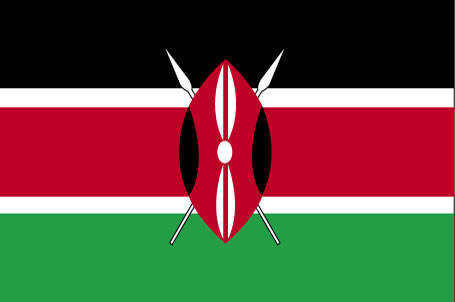 By Tanya Ishikawa By Tanya Ishikawa
Karibu.
Nimefurahi kukutana na wewe.
Coloradoans will have an historic opportunity to use these Swahili greetings of “Welcome” and “Glad to meet you,” when a delegation of Kenyan presidential candidates, Orange Democratic Movement officials, and national women leaders visit Denver from June 23 to July 4.
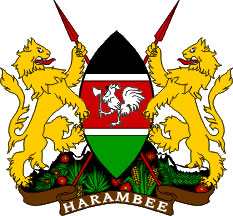 About 30 statesmen and women are expected to travel from Kenya to the Mile-High City to meet with the business community, educators, local and state officials, and a wide range of organizations from scientific to cultural. They will attend 13 days of forums and receptions, many open to the public, with the aim of sharing their visions for Kenya’s future, as well as developing economic and social partnerships for their nation. About 30 statesmen and women are expected to travel from Kenya to the Mile-High City to meet with the business community, educators, local and state officials, and a wide range of organizations from scientific to cultural. They will attend 13 days of forums and receptions, many open to the public, with the aim of sharing their visions for Kenya’s future, as well as developing economic and social partnerships for their nation.
“The Kenyan community here will have the opportunity to talk to members of the delegation about how they plan to implement the politics they tell us, or whether they will be like the past government,” said Dominic Otieno, a Kenyan expatriate and member of the committee organizing the visit.
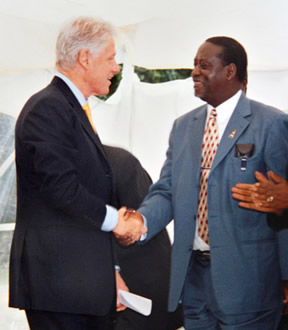 “What an awesome opportunity to bring them overseas and have people say what they want to do when they get into government,” added Kennedy Ambundo, another Kenyan committee member. “What an awesome opportunity to bring them overseas and have people say what they want to do when they get into government,” added Kennedy Ambundo, another Kenyan committee member.
Many of the Kenyan visitors belong to the Orange Democratic Movement of Kenya (ODM-K), a support organization for political candidates who defeated a 2005 constitutional referendum, which would have centralized government power and decreased regional representation. The movement, which has become one of Kenya’s newest political parties, hopes to replace current national leaders who did not uphold their political agreements after being elected.
Of the eight presidential candidates expected in Denver, Raila Odinga is favored to win the election, scheduled for December. The son of Kenya’s first vice president and a current member of parliament, Odinga was under house arrest and jailed numerous times from 1982 to 1991, for an alleged coup attempt and revolutionary involvement. These years coincided with the period when the Kenyan assembly instituted single-party rule.
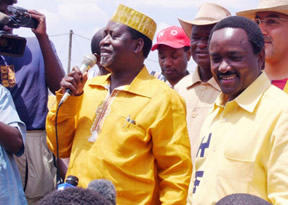 Odinga’s closest opponents in the election are incumbent President Mwai Kibaki and Kalonzo Musyoka (right, with Odinga), a former foreign minister who is expected in Denver this month. Other candidates scheduled to arrive are William Ruto, Musalia Mudavadi, Uhuru Kenyatta, Najib Balala, Julia Ojiambo, and Joseph Nyagah – all leaders in their political parties and current or former cabinet ministers and assembly members. Odinga’s closest opponents in the election are incumbent President Mwai Kibaki and Kalonzo Musyoka (right, with Odinga), a former foreign minister who is expected in Denver this month. Other candidates scheduled to arrive are William Ruto, Musalia Mudavadi, Uhuru Kenyatta, Najib Balala, Julia Ojiambo, and Joseph Nyagah – all leaders in their political parties and current or former cabinet ministers and assembly members.
Several prominent Kenyan women will be part of the delegation, including Odinga’s wife, Aida, the chair of the League of Kenyan Women Voters. Also expected to visit are Mumbi Ngaru, a former mayor who started the Women's Movement in the ODM-K, and Linah Kilimo, one of Kenya’s first women national assembly members. Women make up 8 percent of the assembly.
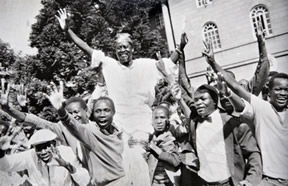
Odinga being carried from a courthouse
after being freed from false charges in 1992
“There are a lots of issues affecting women and girls, and they want interaction and information on how to handle certain issues as women in Kenya, and how to learn what to do to lift up the women’s status in Kenya,” said Mellissa Rogers, another member of the organizing committee member for the Denver visit.
The committee was formed by the Friends of Leadership, Development and Governance, a Denver organization founded by Kenyan residents to foster leadership and development in Kenya. The organization researches development opportunities, and creates events and relationships where community leaders can interact with stakeholders of development.
“Development is a basic human right, just like shelter, food and clothing,” said Friends cofounder Joseph Koyugi.
In 1963, when Kenya gained its independence from British colonization, the African country paralleled South Korea in its economic level and development, but nearly 50 years later, South Korea’s economy is 40 times the size of Kenya’s, Koyugi explained.
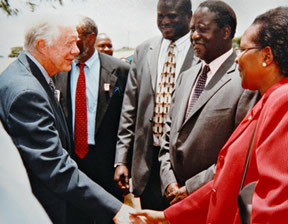
Former President Carter and Odinga
The Kenyan economy suffers from a negative trade balance, power shortages, government monopolies, endemic corruption, high population growth, high poverty, unemployment as high as 50 percent, and only 12 percent of its roads are paved, according to the Kenyalogy Web site, an online Kenya safari guide.
“Development can only happen with the right leadership. Good leadership and development are tied. You cannot separate them,” Koyugi said.
He and other Kenyans in Colorado, which number around 500, will have the chance to understand and influence their country’s prospective leaders through the upcoming visit. Other visit organizers include the African-American Leadership Institute, the Colorado Black Chamber of Commerce, the Webb Group International, the Arapahoe County Public Airport Authority, and the Denver Urban Spectrum newspaper.
“When the African-American Leadership Institute was conceptualized in 1977, there was a strong belief that we should reach out both nationally and internationally to address the issue of leadership relative to Black people. What better way than to connect with those who have inherited the responsibility for leading Black people out of bondage in their own land?”, proclaimed Institute President Linda Williams.
“We have no idea the positive impact this relationship could have on the people of Denver and the people of Kenya,” said Williams. “Why should we continue to live in darkness and denial relative to the past, present and future of Africa? Our children need ties to a true history, one that they can connect to; one that loves and respects their Blackness; one that carves their destiny in authentic leadership; one that offers them opportunities to make significant changes in the economy of such a great continent; one that allows them to use their intellect.”
Editor’s note: For more event information or sponsorship opportunities for the Kenyan delegation visit, call the Friends of Leadership, Development and Governance at 720-329-0984, or the African-American Leadership Institute at 303-299-9035.
Return To Top
Quick Facts about Kenya
- Nariobi, Kenya’s capitol, became Denver’s third sister city in 1975.
- Kenya is on the equator on the east coast of Africa, bordered by Somalia, Ethiopia, Sudan, Uganda, Tanzania, and the Indian Ocean.
- Kenya covers an area of approximately 225, 000 square miles, more than twice the size of Colorado.
- Kenya’s highest point is the 17,057-foot peak Batian on Mount Kenya, the second highest summit in Africa and higher than all Colorado peaks.
- Kenya’s major water sources include Lake Turkana, the world's largest permanent desert lake and the world's largest alkaline lake, and Lake Victoria, the world’s largest tropical lake and the world’s second largest fresh water lake.
- Kenya has a population of approximately 32 million, whose official languages are Swahili and English. Numerous indigenous languages are also spoken in the villages.
- Kenya’s largest ethnic groups are the Kikuyu, Luhya, Luo, Kalenjin, and Kamba, while 15 percent of the population consists of Africans from other countries and 1 percent are non-Africans.
- Kenyans’ religions include Protestant (38 percent of the population), Roman Catholic (28 percent), indigenous religions (26 percent), Muslim (6 percent), and others (1 percent).
- Kenya’s government is made up of a 224-member national assembly, representing eight districts, a judiciary branch, and the executive branch with the president and cabinet ministers. Elections are held every five years.
- Kenya’s main exports include coffee, tea, sisal, pyrethrum, consumer goods, fruits, and vegetables, mostly to Uganda, Tanzania, United Kingdom and Germany.
- Kenya’s main imports include machinery, equipment and transport goods, consumer goods, and petroleum products, mostly from the United Kingdom, the United Arab Emirates, South Africa, and Germany.
Return To Top |
